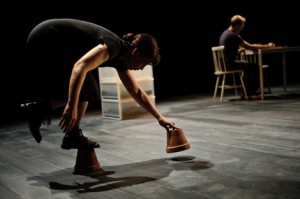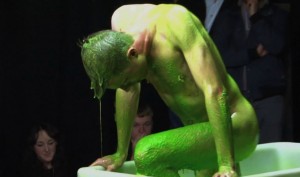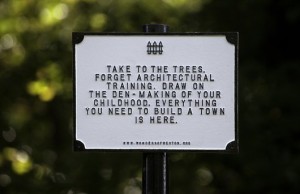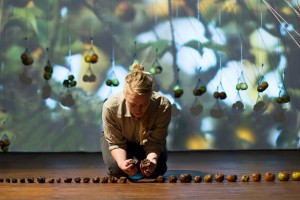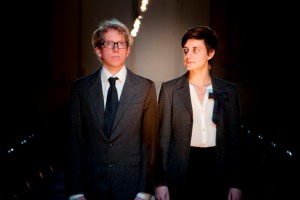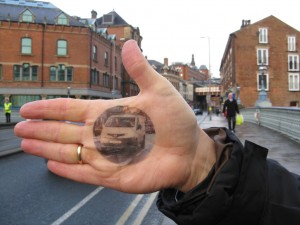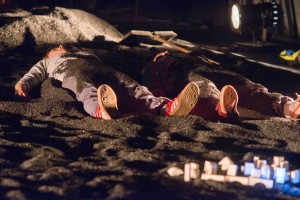Rachael Clerke dives in to defend Dartington’s living legacy in the BA Theatre at Falmouth University, which is threatened with closure
I have a vivid memory of sitting in a tutor’s office during my first semester as a student on the BA Theatre course at Dartington College of Arts, completely lost. ‘You mean we’re not going to do any acting?’ I moaned. ‘But I really like plays!’
I remember being so outraged that, at the age of eighteen, with little-to-no devising experience, I had been put into a studio with a group of five other students and asked to make a show.
How could they let us struggle like this? Where was the adult to direct us? It wasn’t fair!
I had come to Dartington almost by mistake, on the recommendation of a London drama school who pointed out (not gently) that it didn’t sound like I really wanted to be ‘told what to do’, and then sent me a rejection letter on fancy headed paper. It was the best thing that could have happened to me. Because, over the following three years – two at Dartington and one in Falmouth following the 2010 merger – that initial brief was repeated again and again, backed up by classes, workshops, weekly praxis lecture sessions and a public programme that any London venue would be proud of.
Make something. There were variations: Make something outside. Make something on a theme. Make something with Karen Christopher (Goat Island). Make something off-campus. But always, make something. We’ll be here when you need us. We’ll give you the tools. But make it yourselves. And use each other.
And we did. We made large-scale studio performances and installations and one-on-ones in cupboards. We made site-specific pieces in forests, train stations and on buses. We collaborated with our peers: the musicians, writers, choreographers and visual artists on parallel courses. We made good shows and we made awful shows. And no one stopped us from doing any of it.
Dartington was always a Big Idea. The art college opened in 1961 as part of Dorothy and Leonard Elmhirst’s ‘Dartington Experiment’, which sought to bring about social and economic change through education in the arts, farming and rural industries, and scientific research. That this course is founded in such amorphous Big Ideas, and always operated in response to ever-changing social and political environments, is important and has allowed it to constantly push boundaries, beating a path for new ways of thinking about, and making, theatre.
Of course, the rise of theatre by ‘makers’ is in no way exclusively the product of Dartington and Falmouth. The pool of artists operating in this field is now considerable, and more and more venues and festivals are recognising theatre that is devised, DIY, collaborative and experimental over a more traditional programme. Performance work made by artists and actors who author their own work has never been more fashionable. However, this in no way means that there is an abundance of institutions where one can train in this kind of work, and BA Theatre at Falmouth continues to be a pioneering space for young artists.
It is therefore unsurprising that when, on 6 November 2014 – in the same week that education secretary Nicky Morgan asserted that ‘arts subjects limit career choices’ – Falmouth University informed students and staff that they had suspended recruitment to this innovative and experimental course, the decision was met with shock, anger and extreme concern by students, staff, alumni and the wider arts community.
This is not an isolated case; rather it is symptomatic of a worrying trend across arts education. Whilst the demand for experimental theatre and live art increases, the courses that teach it are being cut. University of Brighton’s Visual Performance BA has recently gone, and in Glasgow the Royal Conservatoire of Scotland’s Contemporary Performance Practice course – a close cousin of Falmouth’s BA Theatre – is routinely under threat. The ground is shaky.
Degrees where students make art by trial and error, allowing for fabulous mistakes in a supportive environment, should not be considered a radical approach – because art is made by trial and error and fabulous mistakes. Most of us have to make bad art, and art that we’re not happy with, and difficult art, before we make anything that anyone might want to pay to see. But the courses that offer this kind of training appear to be diminishing at an alarming rate.
It seems that many current undergraduate students of contemporary theatre in the UK will not graduate with a performance that they own; instead they will perform in a tutor-directed production. Perhaps it is because universities, with increasing pressures to deliver tangible, obvious ‘results’ for their £9k a year fees, yearn for something that is uniformly impressive and coherent, rather than the messy, hit-and-miss collection of shows that my peers and I graduated with. But, whilst this may make the institution look good, what does it do for the students? Performing in a big show may be a great experience, but I doubt it gives many further clues as to what that ominous phrase your practice might mean.
Developing a practice is not an easy thing to get one’s head around, but it is key to the importance of this course. The Practice in Context (formerly the CEP) third year module, where final year students leave the campus for the autumn term to pursue a proposed project of their own is groundbreaking in that it gives students a valuable opportunity run at (and often screw up) a big project before the worries of paying rent-and-bills come into the equation. I attempted to tackle the whole concept of Scottish Nationalism in ten weeks from a cold flat in Glasgow whilst peers built a cabaret performance collective in Istanbul; staged new-town interventions in Hemel Hempstead; and traced their Grandmother’s journey from Romania to England, backwards. I wonder how many graduates from my course and those similar to it have kept making work because that first project post-graduation didn’t come as quite so much of a shock.
I formed my company, Clerke and Joy, whilst a student at Falmouth. We’re small and we’re young and we’ve still got a lot to learn. We still begin each rehearsal process with a feeling of ‘I don’t know how to do this’ (does this ever go away?), and every new opportunity, new piece of work, new piece of writing, feels like a massive step. We’ve also almost fallen apart more times than I can count. But we are kept going by the foundations of training that we learnt on this degree. By the tutors that we can still get in touch with to ask for help. By the artists – from Dartington, Falmouth and elsewhere – who form our community in Bristol. For young companies to survive and continue to produce work we need this community, and the courses that create it. There is very little gain in exclusivity: contrary to what some might believe, we do not make ‘weird’ theatre to be ‘different’. We make it because it is the work that we think needs to be made to respond to the world we live in. It is the work that speaks for, and to us, and we want it to exist within a thriving eco-system.
When we perform at festivals, the most common response we get to telling people where we studied is ‘not another Dartington/Falmouth graduate!’ often quickly followed by ‘I wish I’d done that course’. Whilst other degrees have come and gone, this one has been a constant incubator, and a safe space, for experimental performance, and its impact is clear.
A quick glance at the line-up of any British Live Art festival will demonstrate the sheer quantity of BA Theatre graduates who are currently making high quality work in the UK. To name just three: Martin O’Brien (whose dissertation I read four times whilst writing my own) makes work that is programmed in festivals across the country, and is regularly featured in Live Art Development Agency publications; Ira Brand makes performances that tour internationally and is a core member of Forest Fringe; and 2009 graduate Jo Hellier’s performance installation 97 Years was recently shown as part of SPILL’s National Showcase. Additionally, Falmouth’s high number of international and Erasmus exchange students ensure that this influence is worldwide. This is not because there are loads of people who study on this course; my year had twenty graduates. It is because these are graduates who are not afraid to make. These are people who have come out of university with 6–10 pieces of work under their belts, and the corresponding ups and downs and creative frustrations that go with that.
I am not particularly interested in talking about the ‘Dartington Legacy’. I want to be able to celebrate that place and continue what it did, but also appreciate its new location and changes. Dartington offered a space that embraced new ways of thinking in a rural location – it paved the way for a culture of making that has had an immeasurable influence on the way we think about contemporary performance, art and music practices across Europe. That space was very special, and the legacy of the Elmhirsts lives on; there is no doubt about that. I feel very lucky to have been one of the last people to study there. But to suggest that the Dartington courses were simply unsustainable within a larger institution is missing the point, and ignores all that Falmouth has going for it. Simply, I refuse to believe in Falmouth’s inferior ability to deliver BA Theatre.
The move to Falmouth, although difficult, had the ability to give this course greater authority, legitimising it as a ‘real degree’ and allowing further opportunity for academic learning alongside vocational practice. Falmouth is a respected art school with a history – much like Dartington – of pushing boundaries and embracing forward-thinking, radical arts practices across its many courses. The studios in Falmouth’s Performance Centre, built to house the students who migrated from Dartington and their successors, are high-tech, light and a pleasure to make work in. The teaching staff – all practicing artists with a wealth of experience – are second-to-none and include artists from Exeter-based Wrights and Sites, solo makers Katie Etheridge and Misri Dey, Lone Twin’s Gary Winters, and ‘walking’ practitioner Misha Myers. The course also continues to welcome an incredible array of guest lecturers and visiting companies. During my degree I had the opportunity to watch, learn from and work with artists such as Gob Squad, Mike Pearson, Tim Etchells, Cuppola Bobber, and Zierle and Carter. This tradition of bringing in exciting outside practitioners has continued in Falmouth. In short, we need to be sure that we are looking forwards, not back.
The university has stated that it will continue to run, and expand, its one year-old BA Acting course. Whilst this sounds, for an acting course, radical in its own right, I fear hugely for what it means to move away from a culture of making. An acting degree will never be able to implant the independence and DIY attitude of the Theatre course. Besides this, there is the semantic problem: very few of my peers would have applied for BA Acting, no matter how alternative it claimed to be.
We need a degree for re-thinking theatre. A space for young people who want to make, backed up by lectures that address the urgency of responding to the world we live in and demonstrated by people who are doing it. We need a space to create so that when we emerge into a harsh and unstable world we have the know-how, confidence and desire to keep making.
BA Theatre offers an urgent, daring and innovative degree with a rich history and has a huge impact on the performance eco-system in the UK and across the world. It deserves to have the space at Falmouth to continue and grow.
Falmouth University’s website states that it is ‘a specialist creative multi-arts institution for rethinking convention and outthinking challenges’. I honestly can’t think of a course that more fully echoes these assertions.
Anyone wishing to sign the petition to save BA Theatre at Falmouth can do so here.
Featured image (top of the page): Clerke and Joy with early work, an act called The Gogglettes set in Dartington’s disused swimming pool. Photo by Paul Samuel White.
For more about Clerke and Joy, see the website.


